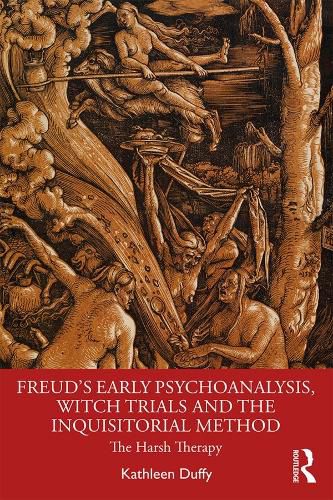Readings Newsletter
Become a Readings Member to make your shopping experience even easier.
Sign in or sign up for free!
You’re not far away from qualifying for FREE standard shipping within Australia
You’ve qualified for FREE standard shipping within Australia
The cart is loading…






In Freud’s Early Psychoanalysis, Witch Trials and the Inquisitorial Method: The Harsh Therapy, author Kathleen Duffy asks why Freud compared his ‘hysterical’ patients to the accused women in the witch trials, and his ‘psychoanalytical’ treatment to the inquisitorial method of their judges. He wrote in 1897 to Wilhelm Fliess: ‘I … understand the harsh therapy of the witches’ judges’. This book proves that Freud’s view of his method as inquisitorial was both serious and accurate.
In this multidisciplinary and in-depth examination, Duffy demonstrates that Freud carefully studied the witch trial literature to develop the supposed parallels between his patients and the witches and between his own psychoanalytic method and the judges’ inquisitorial extraction of ‘confessions’, by torture if necessary. She examines in meticulous detail both the witch trial literature that Freud studied and his own case studies, papers, letters and other writings. She shows that the various stages of his developing early psychoanalytic method, from the ‘Katharina’ case of 1893, through the so-called seduction theory of 1896 and its retraction, to the ‘Dora’ case of 1900, were indeed in many respects inquisitorial and invalidated his patients’ experience.
This book demonstrates with devastating effect the destructive consequences of Freud’s nineteenth-century inquisitorial practice. This raises the question about the extent to which his mature practice and psychoanalysis and psychotherapy today, despite great achievements, remain at times inquisitorial and consequently untrustworthy. This book will therefore be invaluable not only to academics, practitioners and students of psychoanalysis, psychotherapy, literature, history and cultural studies, but also to those seeking professional psychoanalytic or psychotherapeutic help.
$9.00 standard shipping within Australia
FREE standard shipping within Australia for orders over $100.00
Express & International shipping calculated at checkout
In Freud’s Early Psychoanalysis, Witch Trials and the Inquisitorial Method: The Harsh Therapy, author Kathleen Duffy asks why Freud compared his ‘hysterical’ patients to the accused women in the witch trials, and his ‘psychoanalytical’ treatment to the inquisitorial method of their judges. He wrote in 1897 to Wilhelm Fliess: ‘I … understand the harsh therapy of the witches’ judges’. This book proves that Freud’s view of his method as inquisitorial was both serious and accurate.
In this multidisciplinary and in-depth examination, Duffy demonstrates that Freud carefully studied the witch trial literature to develop the supposed parallels between his patients and the witches and between his own psychoanalytic method and the judges’ inquisitorial extraction of ‘confessions’, by torture if necessary. She examines in meticulous detail both the witch trial literature that Freud studied and his own case studies, papers, letters and other writings. She shows that the various stages of his developing early psychoanalytic method, from the ‘Katharina’ case of 1893, through the so-called seduction theory of 1896 and its retraction, to the ‘Dora’ case of 1900, were indeed in many respects inquisitorial and invalidated his patients’ experience.
This book demonstrates with devastating effect the destructive consequences of Freud’s nineteenth-century inquisitorial practice. This raises the question about the extent to which his mature practice and psychoanalysis and psychotherapy today, despite great achievements, remain at times inquisitorial and consequently untrustworthy. This book will therefore be invaluable not only to academics, practitioners and students of psychoanalysis, psychotherapy, literature, history and cultural studies, but also to those seeking professional psychoanalytic or psychotherapeutic help.